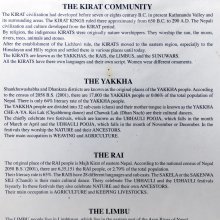Rai, Rāī, Ṟai: 18 definitions
Introduction:
Rai means something in Hinduism, Sanskrit, Marathi, Jainism, Prakrit, Hindi, biology, Tamil. If you want to know the exact meaning, history, etymology or English translation of this term then check out the descriptions on this page. Add your comment or reference to a book if you want to contribute to this summary article.
Images (photo gallery)
Biology (plants and animals)
Source: Wisdom Library: Local Names of Plants and DrugsRai [राई] in the Hindi language is the name of a plant identified with Picea smithiana (Wall.) Boiss. from the Pinaceae (Pine) family having the following synonyms: Picea morinda. For the possible medicinal usage of rai, you can check this page for potential sources and references, although be aware that any some or none of the side-effects may not be mentioned here, wether they be harmful or beneficial to health.
Rai in the Hindi language is the name of a plant identified with Abies pindrow (Royle ex D.Don) Royle from the Pinaceae (Pine) family having the following synonyms: Abies himalayensis, Pinus pindrow, Pinus spectabilis var. pindrow.
Source: Google Books: CRC World Dictionary (Regional names)1) Rai in India is the name of a plant defined with Abies pindrow in various botanical sources. This page contains potential references in Ayurveda, modern medicine, and other folk traditions or local practices It has the synonym Pinus spectabilis D. Don var. pindrow (Royle ex D. Don) Vossin Putlitz & Meyer (among others).
2) Rai is also identified with Abies spectabilis It has the synonym Pinus webbiana Lindl. (etc.).
3) Rai is also identified with Callicarpa longifolia It has the synonym Callicarpa longifolia var. horsfieldii (Turcz.) Moldenke (etc.).
4) Rai is also identified with Rhizophora apiculata It has the synonym Rhizophora candelaria DC. (etc.).
5) Rai is also identified with Rhizophora mucronata It has the synonym Mangium candelarium Rumphius (etc.).
Example references for further research on medicinal uses or toxicity (see latin names for full list):
· Prodr. (DC.) (1828)
· Species Plantarum
· Pak. J. Pharm. Sci. (2007)
· J. Int. Conifer Preserv. Soc. (2008)
· Hist. Nat. des Végétaux - Phanérogames (1841)
· Taxon (1982)
If you are looking for specific details regarding Rai, for example diet and recipes, extract dosage, health benefits, pregnancy safety, side effects, chemical composition, have a look at these references.

This sections includes definitions from the five kingdoms of living things: Animals, Plants, Fungi, Protists and Monera. It will include both the official binomial nomenclature (scientific names usually in Latin) as well as regional spellings and variants.
Languages of India and abroad
Marathi-English dictionary
Source: DDSA: The Molesworth Marathi and English Dictionaryrāī (राई).—f (rājikā S) Mustard, Sinapis racemosa. rāīcā parvata karaṇēṃ To make a mountain of a molehill.
--- OR ---
rāī (राई).—f (rāji S Row.) A wood or thick grove.
Source: DDSA: The Aryabhusan school dictionary, Marathi-Englishrāī (राई).—f Mustard. A wood or thick grove. rāīcā parvata karaṇēṃ To make a mountain of a mole-hill.
Marathi is an Indo-European language having over 70 million native speakers people in (predominantly) Maharashtra India. Marathi, like many other Indo-Aryan languages, evolved from early forms of Prakrit, which itself is a subset of Sanskrit, one of the most ancient languages of the world.
Sanskrit dictionary
Source: DDSA: The practical Sanskrit-English dictionaryRai (रै).—1 P. (rāyati)
1) To sound.
2) To bark at.
--- OR ---
Rai (रै).—m. [rāteḥ ḍaiḥ Uṇādi-sūtra 2.63] (Nom. rāḥ, rāyau rāyaḥ)
1) Wealth, property, riches; अग्ने नय सुपथा राये (agne naya supathā rāye) Īśop.18. रायः कलत्रं पशवः सुतादयः (rāyaḥ kalatraṃ paśavaḥ sutādayaḥ) Bhāgavata 7.7.39.
2) Gold.
3) A sound.
Source: Cologne Digital Sanskrit Dictionaries: Shabda-Sagara Sanskrit-English DictionaryRai (रै).—r. 1st cl. (rāyati) To sound.
--- OR ---
Rai (रै).—m.
(-rāḥ) 1. Wealth property, substance. 2. Gold. 3. Sound, noise. E. rā to give, aff. ḍai.
Source: Cologne Digital Sanskrit Dictionaries: Benfey Sanskrit-English DictionaryRai (रै).—i. 1, [Parasmaipada.] To bark.
— Cf. [Latin] latrare.
--- OR ---
Rai (रै).— (cf. rayi), m. 1. Wealth, property,
— Cf. [Latin] res.
Source: Cologne Digital Sanskrit Dictionaries: Cappeller Sanskrit-English DictionaryRai (रै).—[masculine] ([feminine]) possession, wealth, riches.
Source: Cologne Digital Sanskrit Dictionaries: Monier-Williams Sanskrit-English Dictionary1) Rai (रै):—1. rai [class] 1. [Parasmaipada] ([Dhātupāṭha xxii, 23]) rāyati, to bark, bark at ([accusative]), [Ṛg-veda]
2) cf. [Latin] latrare; [Lithuanian] réti, lóti; [Slavonic or Slavonian] lajati; [Gothic] laian.
3) 2. rai m. ([nominative case] rās?) barking, sound, noise, [Monier-Williams’ Sanskrit-English Dictionary]
4) 3. rai m. rarely f. ([from] √rā [nominative case] rās [accusative] rāyam or rām [instrumental case] rāyā [dative case] rāye; [ablative] [genitive case] rāyas [locative case] rāyi; [dual number] rāyau, rābhyām, rāyos; [plural] [nominative case] rāyas; [accusative] rāyas, rāyas or rās; [instrumental case] rābhis; [dative case] [ablative] rābhyas [genitive case] rāyām [locative case] rāsu; cf. the cognate stems 3. rā and rayi and [Latin] rēs, rēm), property, possessions, goods, wealth, riches, [Ṛg-veda; Atharva-veda; Brāhmaṇa; ???; Bhāgavata-purāṇa]
5) ind. [gana] cādi
Source: Cologne Digital Sanskrit Dictionaries: Yates Sanskrit-English Dictionary1) Rai (रै):—rāyati 1. a. To sound.
2) (rāḥ) 4. m. Wealth; gold; noise.
Source: DDSA: Paia-sadda-mahannavo; a comprehensive Prakrit Hindi dictionary (S)Rai (रै) in the Sanskrit language is related to the Prakrit word: Rā.
[Sanskrit to German]
Sanskrit, also spelled संस्कृतम् (saṃskṛtam), is an ancient language of India commonly seen as the grandmother of the Indo-European language family (even English!). Closely allied with Prakrit and Pali, Sanskrit is more exhaustive in both grammar and terms and has the most extensive collection of literature in the world, greatly surpassing its sister-languages Greek and Latin.
Hindi dictionary
Source: DDSA: A practical Hindi-English dictionary1) Raī (रई):—(nf) a churn-staff.
2) Rāī (राई):—(nf) mustard; black mustard; -[kāī karanā] to shatter to pieces; to split into pieces; -[kā parvata/pahāḍa karanā/banānā] to make a mountain of a mole hill; -[nona utāranā] countering the effect of an evil glance (by moving mustard and salt round one’s head and consigning it to flames); —[bhara] very small particle; very small quantity; -[rattī karake] in the minutest details; -[rattī jānanā] to know each and every thing, to know the minutest details, to know every detail.
...
Prakrit-English dictionary
Source: DDSA: Paia-sadda-mahannavo; a comprehensive Prakrit Hindi dictionary1) Rai (रै) in the Prakrit language is related to the Sanskrit word: Rati.
2) Rai (रै) also relates to the Sanskrit word: Ravi.
3) Rāi (राइ) also relates to the Sanskrit word: Rāji.
4) Rāi (राइ) also relates to the Sanskrit word: Rāgin.
5) Rāi (राइ) also relates to the Sanskrit word: Rājin.
6) Rāī (राई) also relates to the Sanskrit word: Rājī.
7) Rāī (राई) also relates to the Sanskrit word: Rātri.
Prakrit is an ancient language closely associated with both Pali and Sanskrit. Jain literature is often composed in this language or sub-dialects, such as the Agamas and their commentaries which are written in Ardhamagadhi and Maharashtri Prakrit. The earliest extant texts can be dated to as early as the 4th century BCE although core portions might be older.
Kannada-English dictionary
Source: Alar: Kannada-English corpusRai (ರೈ):—
1) [noun] valuable possessions; much money, property, etc.; wealth; riches.
2) [noun] gold.
Kannada is a Dravidian language (as opposed to the Indo-European language family) mainly spoken in the southwestern region of India.
Tamil dictionary
Source: DDSA: University of Madras: Tamil LexiconRai (ரை) . The compound of ர் [r] and ஐ. [ai.]
--- OR ---
Ṟai (றை) . The compound of ற் [r] and ஐ. [ai.]
Tamil is an ancient language of India from the Dravidian family spoken by roughly 250 million people mainly in southern India and Sri Lanka.
Nepali dictionary
Source: unoes: Nepali-English Dictionary1) Rāī (राई):—n. a species of wheat;
2) Rāī (राई):—n. a goat like animal found in the Himalayan region;
3) Rāī (राई):—n. 1. Rai; a tribe (a Nepali nationality; among Kirat community); 2. dated a tax-officer; 3. → रायो [rāyo]
Nepali is the primary language of the Nepalese people counting almost 20 million native speakers. The country of Nepal is situated in the Himalaya mountain range to the north of India.
See also (Relevant definitions)
Starts with (+151): Rai khaniu, Rai rai, Rai-gachha, Rai-jamun, Rai-khanew, Raia, Raia, Raiaka, Raiata, Raiava, Raibagha, Raibagha, Raibaghe, Raibare, Raibha, Raibhi, Raibhoga, Raibhya, Raichanak, Raicikya.
Ends with (+2132): Aakayatamarai, Aaraikeerai, Aarakeerai, Aarakkerai, Aavaarai, Aavarai, Abhirai, Acajou vrai, Acanomantarai, Acarai, Aciriyatturai, Adadorai, Adavarai, Agasatamarai, Agati-keerai, Aiaitarai, Aindrai, Akacakkarai, Akacattamarai, Akalarai.
Full-text (+106): Atirai, Raji, Surai, Rais, Rajin, Ragin, Anadara, Riy, Thing-rai, Raycahib, Ra, Rayi, Rai rai, Sughara, Rayavani, Daashi mai-yawan rai, Ya-rai-so, Ratri, Rayas, Raisa.
Relevant text
Search found 48 books and stories containing Rai, Rāī, Raī, Rāi, Rāi°, Ṟai; (plurals include: Rais, Rāīs, Raīs, Rāis, Rāi°s, Ṟais). You can also click to the full overview containing English textual excerpts. Below are direct links for the most relevant articles:
Atharvaveda and Charaka Samhita (by Laxmi Maji)
Treatments to enhance Female beauty < [Chapter 3 - Diseases and Remedial measures (described in Atharvaveda)]
4a. Kuṣṭha-roga (leprosy) in the Atharvaveda < [Chapter 5 - Diseases and Remedies in Atharvaveda and Caraka-Saṃhitā]
Medicinal herbs and plants in the Atharva-veda < [Chapter 3 - Diseases and Remedial measures (described in Atharvaveda)]
The Devi Bhagavata Purana (by Swami Vijñanananda)
The Markandeya Purana (by Frederick Eden Pargiter)
Kavyamimamsa of Rajasekhara (Study) (by Debabrata Barai)
Part 8.9 - Characteristics of Varṣā-kāla (rainy season) < [Chapter 5 - Analyasis and Interpretations of the Kāvyamīmāṃsā]
Part 8.14 - Characteristics of Grīṣma-kāla (summer season) < [Chapter 5 - Analyasis and Interpretations of the Kāvyamīmāṃsā]
Lord Jhulelal: An Analytical Study (by Thakkar Harish Gopalji)
Part 5.1 - Shri Amar Katha–Shri Jhulelalji < [Chapter 2 - Literature Review]
Part 5.4 - Thakkur Guru Pugar Rai < [Chapter 2 - Literature Review]
Part 7 - Specific Reference of History of Sind < [Chapter 2 - Literature Review]
Related products
(+1 more products available)






